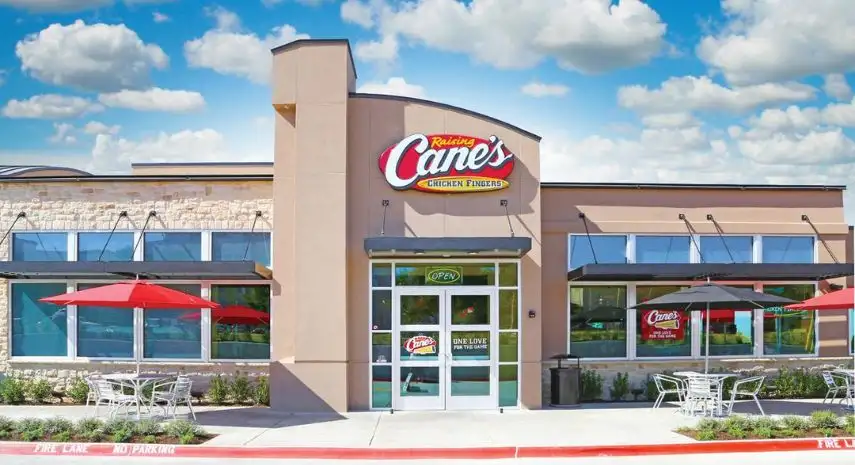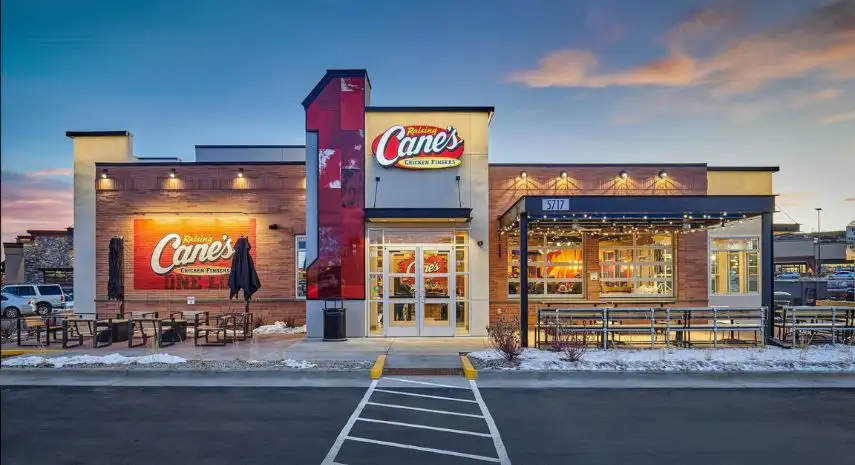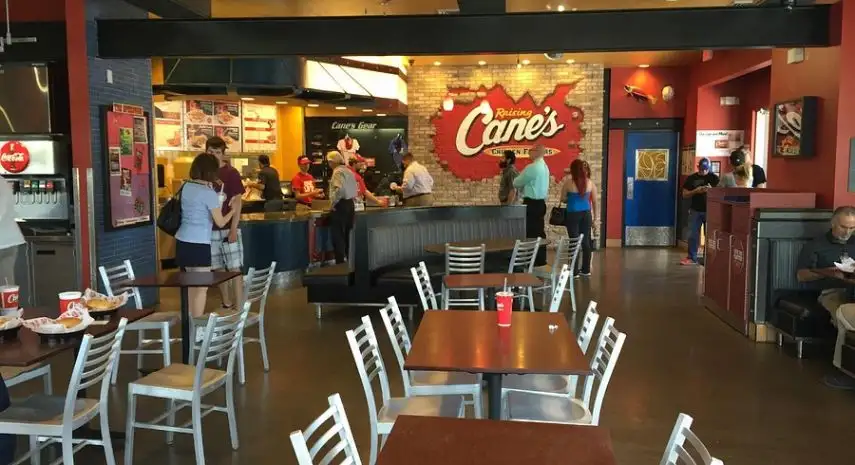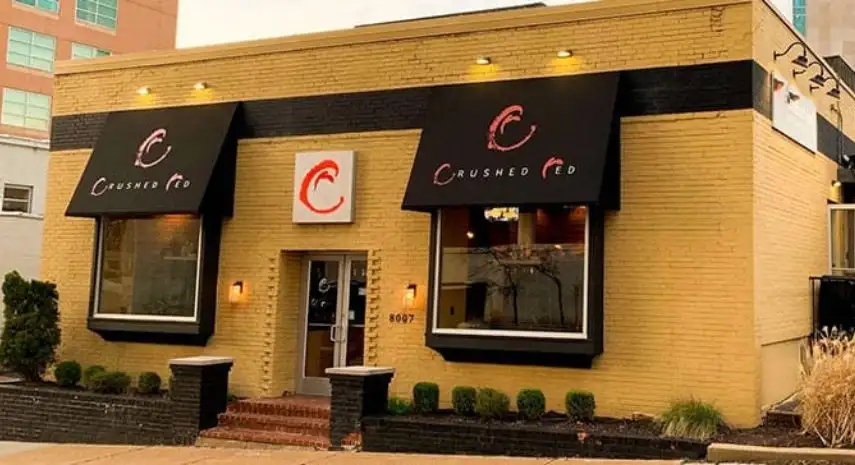Established
1996
Franchise Units
780
Minimum Investment
$768,100
Franchise Fee
$45,000
Total Investment Range
$1,937,500
Home Based
No
Description
Imagine stepping into a thriving quick-service restaurant brand whose laser-focus on one product — chicken fingers — has earned it an almost cult-like following across America. That’s exactly what Raising Cane’s Chicken Fingers brings to the table. With a streamlined menu, a passionate brand culture, and exceptional speed of service, Raising Cane’s has differentiated itself from the cluttered fast-food market. For an investor seeking a standout concept with national momentum, the Cane’s story is compelling: it’s not just another chicken joint — it’s the chicken finger brand that hones in on simplicity, quality and a loyal fan base.
From its roots near a college campus in Baton Rouge to its ever-growing presence in the U.S., the brand has built a strong reputation for both operational efficiency and community connection. For the savvy entrepreneur, this means an opportunity to ride on proven brand momentum, rather than starting from scratch. While the franchise model may be in a unique stage today, understanding the Raising Cane’s story, what it offers investors, and the ideal franchisee profile gives you a sharp lens on where opportunity lies — and what hurdles you’ll need to clear.
Why Invest in this Franchise?
-
Niche dominance with a simple concept. Raising Cane’s isn’t trying to serve everything to everyone – it has honed in on one-love: chicken fingers, crinkle fries, Texas toast and its signature Cane’s Sauce. That laser-focus reduces complexity, lowers waste and speeds service.
-
Strong brand resonance and loyalty. Customers know and love the Cane’s experience. That emotional connection helps drive repeat visits, word-of-mouth buzz and strong drive-thru performance.
-
Scalability in a growth market. The quick-service chicken segment remains dynamic, and Raising Cane’s is actively expanding. For investors, being part of a growth story is key.
-
Operational system built on simplicity. With one menu item focus, streamlined kitchen workflow, and consistent brand standards, the learning curve is more manageable than full-menu competitors.
-
Community-first positioning. Raising Cane’s emphasizes culture, crew (staff) excellence and local engagement, which strengthens customer loyalty and reputation in communities.
-
Potential for multi-unit scaling (where available). While single-units are standard, seasoned operators may explore multi-unit ownership strategies in suitable markets.
-
Strong franchisor leadership and founder presence. With founder Todd Graves still actively involved, the brand retains clarity of vision and identity.
Background
Raising Cane’s Chicken Fingers is one of America’s most recognizable quick-service restaurant brands, built on a simple yet powerful concept: serving high-quality chicken fingers with exceptional service and a strong community focus.
Founded & Founders:
Raising Cane’s was founded in 1996 in Baton Rouge, Louisiana, by Todd Graves and Craig Silvey. The idea began as a college business plan that initially received little support — even being rejected by a professor who thought a “chicken finger–only restaurant” wouldn’t work. Todd Graves, however, believed in his vision. After working long hours on construction and commercial fishing jobs to raise capital, he opened the first Raising Cane’s near the Louisiana State University campus.
The Origin of the Name:
The brand’s name was inspired by Todd’s beloved Labrador Retriever, “Raising Cane,” who often accompanied him to the restaurant. This fun and personal touch has since become an iconic part of the brand’s identity, symbolizing loyalty, positivity, and energy.
Growth Journey:
From one small location in 1996, Raising Cane’s has evolved into a nationally recognized restaurant chain with a passionate following. Over the years, it expanded across more than 42 U.S. states and several international markets, including Kuwait, Saudi Arabia, and Bahrain. Today, the brand operates over 780 locations worldwide, and continues to grow rapidly — particularly across the United States, where demand for fast, high-quality chicken concepts remains strong.
Brand Identity & Culture:
The company lives by its motto: “One Love®” — representing its commitment to serving only one thing and doing it better than anyone else. This simplicity, paired with its dedication to crew (employees), customers, and community, defines its success. Each restaurant emphasizes upbeat service, consistent food quality, and an energetic, friendly atmosphere.
Ownership & Company Structure:
Raising Cane’s remains privately held and founder-led by Todd Graves, who continues to play an active role in the company’s expansion and culture. Unlike many large restaurant brands, Raising Cane’s has chosen to maintain tight operational control by keeping most of its locations company-owned rather than franchised. This ensures that every restaurant reflects the brand’s high standards and unique culture.
Industry Category & Market Position:
Raising Cane’s operates within the quick-service restaurant (QSR) and fast-casual chicken segment, one of the most competitive yet fastest-growing sectors in American dining. Its menu simplicity and operational efficiency allow it to outperform many traditional QSR chains that struggle with complexity and higher costs.
Reputation & Recognition:
The brand consistently ranks among the top restaurant chains in customer satisfaction and employee engagement. It has been recognized by publications such as Forbes and Nation’s Restaurant News for its strong company culture, leadership, and explosive growth. Fans are deeply loyal, often waiting in long lines during openings, making each new store launch a local event.
Franchise Availability:
Historically, Raising Cane’s offered franchise opportunities during its early expansion years. However, in recent years, the company has paused new franchise applications and shifted focus to opening more corporate-owned restaurants. This strategy ensures brand consistency, operational excellence, and direct control over the customer experience.
Mission & Community Focus:
Raising Cane’s is built around three pillars: Crew, Customers, and Community. Each location is encouraged to engage in local events, sponsor youth activities, and contribute to community programs. This community-first approach has helped build a loyal customer base and long-lasting brand goodwill across the country.
Support Training
For any franchise model (or potential franchise model) of Raising Cane’s, you can expect a robust support infrastructure focused on helping new units launch and then sustain operations — assuming franchising is available or reopened. Key areas of support include:
-
Pre-launch support: Site selection assistance, lease or build-out guidance, design/build standards, equipment procurement, and initial launch planning.
-
Training & academic programs: New franchisees and their management team typically undergo classroom and on-the-job training covering operations, kitchen workflow, crew staffing, customer service, inventory management, and brand culture. Raising Cane’s emphasizes “crew, cool culture, community” as foundational to its training ethos.
-
Marketing & grand-opening support: Local marketing playbooks, grand-opening campaigns, participation in national brand marketing efforts, digital marketing guidance, drive-thru optimization, menu launch coordination, and supply chain integration.
-
Operational systems & field support: Ongoing operational manuals, standard operating procedures, regular field visits by the corporate team, and periodic audits or mystery shopping to maintain quality standards.
-
Supply chain & purchasing leverage: Leveraging the brand’s volume purchasing power means franchisees benefit from negotiated vendor contracts, centralized logistics, and consistent ingredient quality.
-
Ongoing development & support: As new menu items, technology upgrades, crew retention strategies, and marketing innovations roll out, franchise partners receive updates and implementation support.
-
Brand culture & community engagement: Raising Cane’s emphasizes local community involvement, staff development, and brand ethos — franchise partners are supported in integrating the culture locally, benefitting reputation and customer loyalty.
In short, if you join this brand you’re not operating alone — you receive support from a company that's built hundreds of units and knows the drill. The key is that, although franchising may be paused or limited, the systems in place are robust.
Ideal Candidate
For a brand like Raising Cane’s, the ideal investor or entrepreneur profile encompasses more than just capital. Here's a detailed description of the kind of person who would fit best:
-
Entrepreneurial drive & passion for hospitality/food service. You should love the fast-paced environment, be committed to delivering excellent customer service, and be willing to immerse yourself in daily operations, at least early on.
-
Business background or partner with experience. Strong preference for someone with operational or multi-unit restaurant experience, or a partner who brings those skills. Even if you don’t have prior restaurant ownership, you should have significant business management experience.
-
Financial capacity. Because investment levels are substantial (see Financial Details below), you should have strong net worth and liquid assets, ideally with capacity for multi-unit growth in the medium term.
-
Location mindset & real estate savvy. You should have or be willing to develop skills in site selection, lease negotiation, and market analysis. Recognizing traffic patterns, real estate value, demographics and competition will be critical for success.
-
Commitment to brand standards and culture. Raising Cane’s brand identity is strong — colorful, community-oriented, and crew-centric. The ideal franchisee lives those values, invests in team culture and maintains high standards of quality and brand consistency.
-
Operational involvement and leadership. Especially in early days, you’ll need to engage in building your crew, hiring and training staff, overseeing launch metrics, and monitoring daily performance. As you scale, you might step back into an oversight role.
-
Willingness to scale. While a single unit may be your starting point, the brand’s growth profile rewards multi-unit thinking. The ideal investor thinks long-term: one unit now, then build regionally.
-
Community orientation. Because the brand emphasizes local community engagement, you should be comfortable being visible in your market, engaging with local schools, sports teams, charities or other organizations to embed the brand locally.
-
Risk tolerance & patience. As with any restaurant business, location, lease costs, labor, and supply chain all matter. The ideal franchisee understands that while the brand offers strong support, success comes from execution.
In summary: someone with business acumen, financial strength, hospitality or real-estate orientation, and a heart for brand culture and local community will thrive.
Financial Detail
Below is an estimated breakdown of the Raising Cane’s Franchise Financial Details — based on available historical data and industry averages. While the company currently focuses on corporate-owned expansion, these figures provide a clear understanding of the typical financial range and investment required if franchise opportunities reopen in the future.
| Financial Category | Estimated Amount (USD) | Description / Notes |
|---|---|---|
| Initial Franchise Fee | $45,000 | One-time fee paid to the franchisor to operate under the Raising Cane’s brand name. |
| Total Initial Investment | $768,100 – $1,937,500 | Includes build-out, kitchen equipment, interior décor, signage, permits, and pre-opening costs. |
| Building & Leasehold Improvements | $350,000 – $900,000 | Covers restaurant construction, drive-thru installation, and interior finishing. |
| Equipment & Furnishings | $150,000 – $350,000 | Includes kitchen appliances, POS systems, furniture, and fixtures. |
| Initial Inventory | $15,000 – $30,000 | First supply of food, packaging, and beverages for launch. |
| Working Capital (3–6 months) | $90,000 – $250,000 | Cash reserves to cover salaries, utilities, and early operating expenses. |
| Grand Opening & Marketing | $20,000 – $50,000 | Pre-launch promotions, advertising, and local marketing initiatives. |
| Training Expenses | $10,000 – $25,000 | Travel, lodging, and materials for management and crew training. |
| Technology & POS Systems | $15,000 – $30,000 | Hardware/software setup for efficient order and inventory management. |
| Royalty Fee | 5% of Gross Sales | Ongoing fee to the franchisor for continued support and brand use. |
| National Marketing / Advertising Fee | 4–5% of Gross Sales | Contribution to brand-wide marketing campaigns and digital advertising. |
| Minimum Net Worth Requirement | $1.5 Million | Required overall financial capacity of a qualified franchise investor. |
| Minimum Liquid Capital Requirement | $750,000 | Minimum available cash or easily liquidated assets. |
| Average Unit Volume (AUV) | $1.5 Million+ (Estimated) | Average annual sales per restaurant based on comparable QSR performance. |
| Expected ROI Timeline | 2 – 4 Years | Estimated time to achieve return on investment, depending on location and performance. |
| Break-even Period | 24 – 36 Months | Typical timeline to reach profitability after opening. |
| Franchise Term | 10 Years (Renewable) | Typical duration of the initial franchise agreement. |
| Ongoing Renewal Fee | $5,000 – $10,000 (Approx.) | Charged at the time of renewal to extend franchise rights. |
| Additional Revenue Streams | Drive-thru, Delivery, Catering, Merchandising | Multiple revenue channels supporting higher unit profitability. |
Key Insights
-
Raising Cane’s franchise model requires significant capital due to its focus on premium real estate and high-quality build-outs.
-
The return potential is attractive, especially in high-traffic, drive-thru–friendly areas such as college towns and suburban markets.
-
Operational simplicity and a loyal customer base contribute to strong unit economics and consistent performance across markets.
-
Corporate oversight ensures brand consistency and operational excellence, which contributes to the company’s strong reputation and high sales volume.







